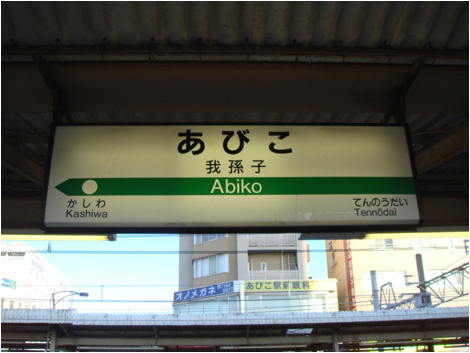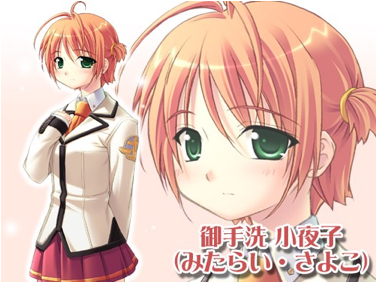Two unusual Japanese names
« previous post | next post »
From time to time, one encounters Japanese names that evoke bygone days. In Japan, though, things that are archaic somehow manage to stay alive in the present. Two realms in which that happens fairly often are place names and surnames.
1.
We are already familiar with some of the oddities of place names from train and metro stations: "Ootori" (8/9/15), "Miswritten character on a Tokyo Metro sign" (7/31/15). Now, from a Chinese point of view, Mengnan Zhang introduces us to another:
It was that time I was in Tokyo, and saw a train passing by with the destination of Wǒsūnzi 我孫子. I was shocked. 孫子 basically means "grandson" in Chinese, and 我孫子 means "my grandson". However, in northern China, especially Beijing, people use 孫子 to curse others, conveying that there is a seniority difference between the two speakers. 我孫子 is just absurd to people who can recognize these three Chinese characters. On the other hand, the different meaning of same words in Chinese and Japanese perfectly shows that although both Chinese-speaker and Japanese-speaker can recognize the characters, they can not communicate since they would interpret in two different ways.

In Japanese, "Abiko" is known only as the name of a town in Chiba Prefecture. This combination of kanji or the pronunciation "Abiko" is never used as a word meaning "my grandson". The dictionary says it is a variation or transformation of the sound abiki(網引)but does not explain why.
One theory of the origins of the Abiko as a toponym is that it was the name of a Yamato-period family who lived in that area.
2.
Every year in my "Language, Script, and Society in China" course, I begin by discussing a unique toilet (otearai お手洗[い], var. 御手洗[い]) sign from Hokkaido that was presented to me by Bob Sanders about a quarter of a century ago, so my students and I are very familiar with that Japanese word.
That exercise prompted Mengnan Zhang to send in the following note and accompanying illustration:
I also think this is interesting since it's related to our latest lecture topic. How could people use “restroom” as their last name, I wondered before reading the hiragana. It's very important for Japanese people to have the hiragana of their names on the name card. Otherwise, it would be so embarrassing if people pronounce 御手洗 as otearai instead of mitarai. But still, as a non-native speaker, I found it's so funny to have 御手洗 as a last name.

This person's full name is Mitarai Sayoko.
御手洗 did not mean "toilet" originally. It designates a place for a purification ceremony with water at the entrance to shrines and temples (see here).
Even today at such religious establishments, there is a section with a small water fountain and scoops so that visitors can wash their hands and mouths before worshipping deities enshrined within. Sometimes streams passing through the area of the shrine or temple serve for this purpose. From this usage, Mitarai came to serve as a clan name, one that has been in existence for a long time. As such, it is a distinguished family name. (PDF of a Japanese study on the surname here.) Mitarai is also the surname of the CEO of Canon and head of Keidanren (Japan Business Federation).
The reading mi– is obsolete but not uncommon for 御. It's used mostly with things related to the emperor / imperial family.
Note from Wiktionary:
In some rare cases, it is pronounced み (mi-), primarily for religious words, pertaining to gods or the emperor, as in 御輿 (mikoshi, a type of shrine). However, in this context it is often replaced by 神 ("god", also pronounced mi-), and then a further 御 (pronounced お, o-) may be added, as in 御神輿 (o-mi-koshi). The mi-prefix also became merged into other kanji, as in 宮 (miya, imperial palace).
The following are for specialists in Japanese, though I will note that the first item is none other than the "mikado" of Gilbert and Sullivan operatic fame:
御門、帝(みかど): 天子
御子(みこ): 皇子
姫御子(ひめみこ):皇女
御屋、宮(みや)
御幸、行幸(みゆき):御幸(ごこう)は別語
御言宣、詔(みことのり)
御墓(みはか):陵(みささぎ)に同じ
Source
More extensive listing here.
[Thanks to Nathan Hopson, Miki Morita, and Cecilia Segawa Seigle]
AP said,
September 10, 2015 @ 10:50 pm
There is an Abiko 我孫子 Station in Osaka also. A lot of the signage is hiragana-only, which I recall hearing was to avoid the bad Chinese connotation this post discusses.
astrange said,
September 10, 2015 @ 11:32 pm
It's possible to find Japanese people whose names can't be written with standard characters:
http://en.rocketnews24.com/2014/02/13/japanese-woman-celebrates-100th-birthday-boggles-netizens-with-her-name/
But at least her name is still in Unicode.
krogerfoot said,
September 11, 2015 @ 4:48 am
Did not know that about 我孫子. It's recognizable as "our grandchild" ("our-grandchild-child") but only the middle one is used for that meaning in modern Japanese, with the reading mago. One of the first things a foreigner who hopes to learn Japanese realizes in Japan is that the kanji you encounter most, place names on train signs and people's names, are the most unpredictable.
I have heard from Japanese people that 手紙 tegami "letter" (as in "~ to the editor") means "toilet paper" in China. I've always felt this was too good to check, and I'm too lazy anyway. Does 手紙 denote something different in Chinese?
Victor Mair said,
September 11, 2015 @ 3:14 pm
Yes, shǒuzhǐ 手紙 means "toilet paper" in Chinese.
January First-of-May said,
September 11, 2015 @ 6:06 pm
The Absurdopedia (Russian Uncyclopedia) article on the Chinese philosopher Sun Tzu uses the characters 孫子 ("grandson", or, as translated in the article, "grandson's son") to stand for the philosopher's name (Sun Zi).
There's a lot of other elaborate puns in that article, but most of them have to do with Russian expletives (the above is one is the very few exceptions).
Michael Watts said,
September 12, 2015 @ 5:15 am
January First-of-May:
Other elaborate puns? Those are the correct characters, not a pun. Though I assume the 子 is a title and not part of his name.
Victor Mair said,
September 12, 2015 @ 6:58 am
For a detailed study of the name Sun Zi ("Master Sun"), see the front matter (and references therein) here:
http://cup.columbia.edu/book/the-art-of-war/9780231133821
Tianran Hang said,
September 12, 2015 @ 9:52 pm
My first reaction to the 我孫子 station name was that it is written using the Man'yōgana (万葉仮名) system, but it seems that neither 我 nor 孫 corresponds to the "a" or "hi" syllable in any case.
An interesting link (http://hijicho.com/sumiyoshi/?p=200) explains that the origin of the place name came from decedents of Korean immigrants and there are some Korean influence in the pronunciation of the place which indeed has a reference to the meaning "my grandson."
January First-of-May said,
September 13, 2015 @ 10:31 am
@ Michael Watts:
They also associated his name with the Russian word "сунь" (insert), and proceeded to make up a brother of his with the name 文子, where the first syllable corresponded with "вынь" (pull out).
That's about as far as I can describe without referring to Russian profanity.
It's actually fairly funny, if you don't mind that most of the Chinese phrases are thinly disguised Russian profanity. (And if you can speak Russian, obviously.)
Mark Dunan said,
September 18, 2015 @ 9:34 am
Tianran Hang, I had never seen that story you reference (with 吾彦, which is much less irregular).
There is also an Azumabashi 吾妻橋 ("My Wife's Bridge") east of Asakusa in Tokyo, with the same pattern. (If it were pronounced "logically", this toponym would be Waga-tsuma-bashi or maybe Gasai-bashi.
The author mentions that a for the first person pronoun (我、吾) could be Korean, but I wouldn't be surprised if it's also a holdover from Old Japanese, because several Okinawan languages also have it, or something like it. On Yonaguni (Taiwan's neighbor), the particle nu has fised to it, giving anu as the regular word, but a-ga (with possessive ga) is still said for "my ~".
As a Japanese speaker who is a beginner in Chinese, It is always interesting to see the perspective of Chinese speakers on these Japanese words and names. The average Japanese person probably doesn't know anything about how 孫子 is used in Mandarin except for its literal meaning.
David Gómez said,
September 24, 2015 @ 3:25 pm
In Shanghainese 阿拉(ālā) is used for the plural and singular first person pronoun. I think that could be another possible source for the 'a' reading for 我, besides the okinawan ones you mention.